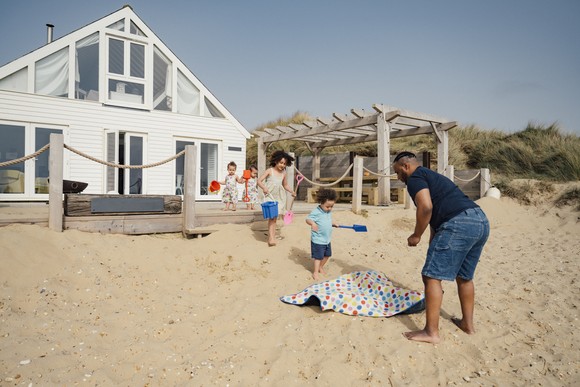To put it mildly, the stock market has generally not been kind to the hundreds of companies that went public via special purpose acquisition companies (SPACs) over the past couple of years. A few SPAC IPOs are trading for more than their $10 initial share prices, but these are the exception, not the rule. Far more of them have lost at least half their value.
Vacasa (VCSA +0.00%) is somewhere in the middle of that pack. It's down by about 15% since its December debut. But look past the stock price performance, and you'll see that the underlying business is firing on all cylinders. Here's what Vacasa does and why patient investors might want to take a closer look at it.

Image source: Getty Images.
Vacasa in a nutshell
Vacasa is a full-service vacation rental property manager with more than 35,000 homes listed on its platform. In exchange for a percentage of collected rental income, it books guests, arranges for cleanings and maintenance, and leverages its technology to maximize revenue for property owners.

NASDAQ: VCSA
Key Data Points
It's worth mentioning that Vacasa isn't a competitor of leading vacation rental listing platform Airbnb (ABNB +0.16%), though that's a common misconception. Quite the opposite, actually. Airbnb is a partner of Vacasa, allowing the company to list its properties on its massive platform to generate bookings in exchange for a relatively small portion of its management fee income. In a nutshell, Airbnb wants companies like Vacasa to succeed.
When it underwent its SPAC merger, it received a large infusion of cash, so at the end of 2021, it had more than $350 million in cash on its balance sheet and virtually no debt. That should provide it the financial flexibility to grow.
Impressive results and a massive growth opportunity
Vacasa recently reported its 2021 results, and to call them impressive would be an understatement. SPAC IPOs are known for making ambitious projections, but this one actually exceeded its initial growth estimates. The company generated $1.9 billion in gross booking volume in 2021, and from this, generated $889 million in revenue -- $130 million more than its initial target. Fourth-quarter revenue grew by 76% year over year despite the disruption that the omicron surge caused for the travel industry.
Its 2022 guidance was also significantly ahead of the company's previously stated goals. Management projects 29% revenue growth at the midpoint of its $1.125 billion to $1.175 billion guidance range. While Vacasa expects a relatively small loss this year, it expects to achieve adjusted EBITDA profitability in 2023. And that could be just the beginning.
As CEO Matt Roberts explained to me in a December 2021 interview, the vacation rental management industry is highly fragmented. There are about 5 million vacation rental properties in the United States right now, and more than 20,000 local property managers who handle them. No other company in this niche has the scale of Vacasa.
Think about that for a second -- Vacasa's 35,000 homes under management make it No. 1 for market share, and it's only managing about 0.7% of U.S. vacation homes. The company could grow to 10 times its current size and still only account for a single-digit percentage of market share. Simply put, a dominant national brand for vacation rental management doesn't exist, and that's what Vacasa is trying to become.
As of this writing, Vacasa trades for about 15% below its $10 SPAC share price, at a valuation of about $3.5 billion. However, keep in mind that it's currently generating nearly $900 million in annual revenue with a market share of less than 1%. As the business continues to scale, profitability should soon arrive, and with fantastic economics, Vacasa could wind up being a big winner for investors, particularly if it can execute on its vision to grow into the dominant national vacation rental management brand.